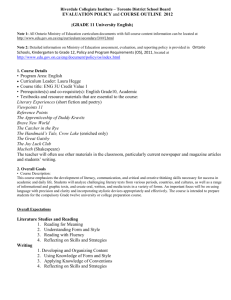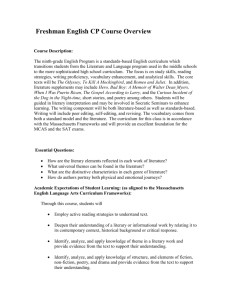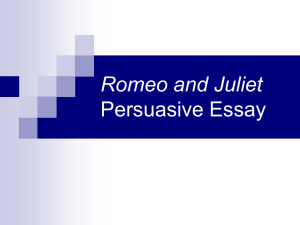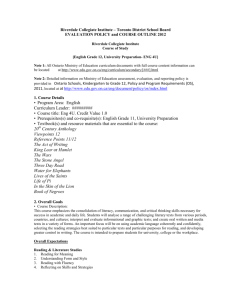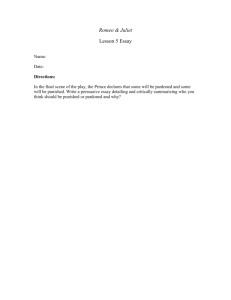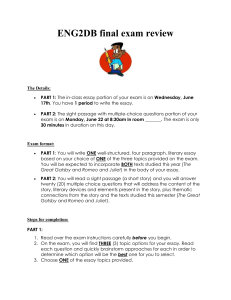Riverdale Collegiate Institute – Toronto District School Board
advertisement
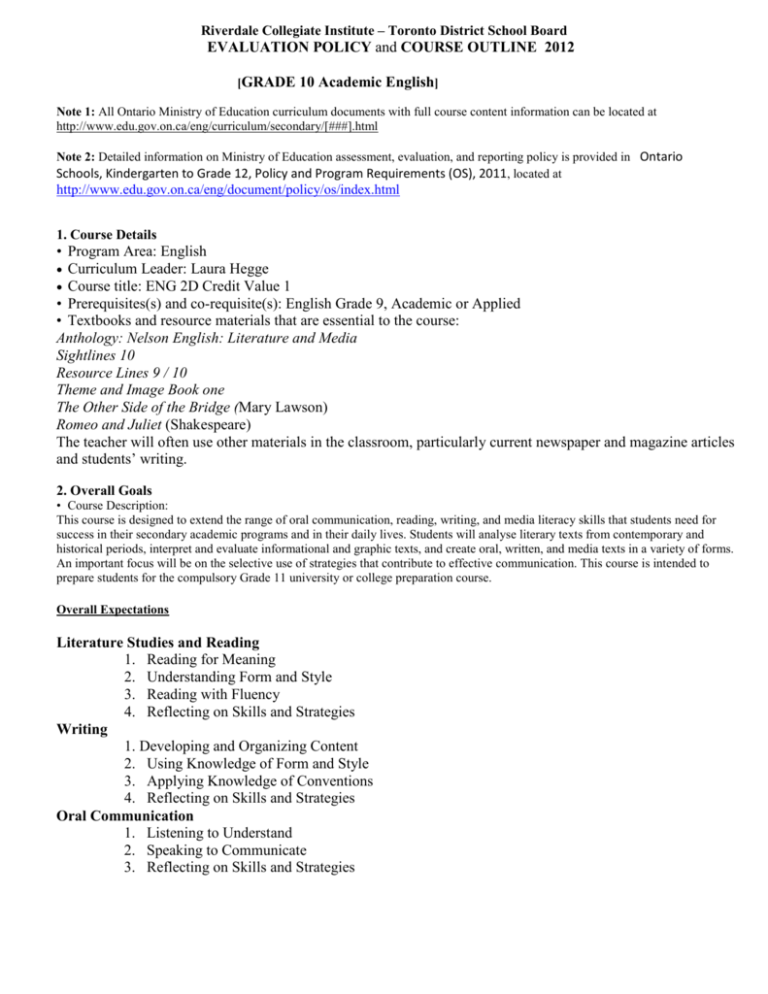
Riverdale Collegiate Institute – Toronto District School Board EVALUATION POLICY and COURSE OUTLINE 2012 [GRADE 10 Academic English] Note 1: All Ontario Ministry of Education curriculum documents with full course content information can be located at http://www.edu.gov.on.ca/eng/curriculum/secondary/[###].html Note 2: Detailed information on Ministry of Education assessment, evaluation, and reporting policy is provided in Ontario Schools, Kindergarten to Grade 12, Policy and Program Requirements (OS), 2011, located at http://www.edu.gov.on.ca/eng/document/policy/os/index.html 1. Course Details • Program Area: English • Curriculum Leader: Laura Hegge • Course title: ENG 2D Credit Value 1 • Prerequisites(s) and co-requisite(s): English Grade 9, Academic or Applied • Textbooks and resource materials that are essential to the course: Anthology: Nelson English: Literature and Media Sightlines 10 Resource Lines 9 / 10 Theme and Image Book one The Other Side of the Bridge (Mary Lawson) Romeo and Juliet (Shakespeare) The teacher will often use other materials in the classroom, particularly current newspaper and magazine articles and students’ writing. 2. Overall Goals • Course Description: This course is designed to extend the range of oral communication, reading, writing, and media literacy skills that students need for success in their secondary academic programs and in their daily lives. Students will analyse literary texts from contemporary and historical periods, interpret and evaluate informational and graphic texts, and create oral, written, and media texts in a variety of forms. An important focus will be on the selective use of strategies that contribute to effective communication. This course is intended to prepare students for the compulsory Grade 11 university or college preparation course. Overall Expectations Literature Studies and Reading 1. Reading for Meaning 2. Understanding Form and Style 3. Reading with Fluency 4. Reflecting on Skills and Strategies Writing 1. Developing and Organizing Content 2. Using Knowledge of Form and Style 3. Applying Knowledge of Conventions 4. Reflecting on Skills and Strategies Oral Communication 1. Listening to Understand 2. Speaking to Communicate 3. Reflecting on Skills and Strategies Media Studies 1. Understanding Media Texts 2. Understanding Media Forms, Conventions, and Techniques 3. Creating Media Texts 4. Reflecting on Media Literacy Skills and Strategies Units/Topics Timing Throughout Course Grammar study work in writing portfolio Sept. / Oct. Unit 1: Non-fiction, opinion pieces Unit 2: Short stories Unit 3: Novel Study / Creative Writing Oct. Nov. Dec./ Jan. Unit 4: Independent Reading Unit 5: Poetry /Play (Romeo and Juliet ) Culminating Activities &/Or Final Exam Preparation Oral presentation / literary essay exam Feb. March March/ April May/ June EVALUATION PLAN As required by the Ministry of Education and Training, each student is evaluated according to the four achievement categories: Knowledge/Understanding, Thinking & Investigation, Communication and Application. These marks are recorded by the English teacher in four strands: Literature Studies and Reading, Writing, Oral Communication and Media. LS & Reading TERM (70%) FINAL EVALUATION (30%) 30% Writing Oral Media 30% 20% 20% This evaluation is cumulative, containing material from all units and will evaluate all 4 achievement categories. Oral (10%) Exam(20%) 70% Term Work Students must demonstrate achievement of all the overall expectations of the course. Unit Task Strand Focus Date Due 1: Non-fiction, opinion The end of unit Media / Writing pieces summative evaluations Oral/ Media will be: sight passage test / supported opinion essay oral presentation /media analysis / listening test/ reflective writing 2: Short stories The end of unit Reading/ Writing summative evaluation will be: short story test 3. Novel study/ Creative The end of unit Writing Writing evaluations will be: Reading/ Writing 4. Independent Reading 5. Poetry / Play (Romeo and Juliet) reading test(s)/ oral research presentation/ literary essay/ reflective writing/ writing portfolio evaluation / dramatic performance/ script The end of unit evaluation will be: oral or written Book Report and Media product The end of unit evaluation will be: Oral Poetry analysis, R&J test/ in class timed essay test (one period) writing portfolio 5 paragraph literary essay (Exam) 20% of grade Culminating Activities Oral presentation (in class) 10% of grade Reading/ Writing / Media / Oral Oral/ Media/ Reading Oral/ Reading Media/ Writing Reading/ Writing/ Oral/ Media In addition to the evaluations listed above, individual teachers may include other evaluations. REPORTING Four Reports Cards will be issued during the year. All reports will give a numeric grade to each student calculated as indicated above. All reports are cumulative. The November, February and April report cards are snapshots of all course work until that point in time. They will be based on the most consistent level of achievement to that point in time. LEARNING SKILLS Learning skills are critical for achievement of the curriculum expectations. On each report card there are 6 learning skills: Responsibility, Organization, Independent Work, Collaboration, Initiative and Self-regulation. Teachers report on the six Learning Skills using the following: E = Excellent, G = Good, S = Satisfactory, N = Needs Improvement. Learning skills are not used to determine a student’s grade in the course. TEACHING /ASSESSMENT AND EVALUATION STRATEGIES A range of teaching, assessment and evaluation strategies will be used to address the needs of students’ learning styles and allow students a variety of methods to demonstrate their achievement of the expectations. Teaching Strategies To facilitate the learning of the various concepts, a variety of teaching strategies will be used and might include: Activity Based Strategies examples: practical laboratory work, oral presentations, field trip, simulations, activity centres) Cooperative Learning Strategies examples: Think-Pair-Share, Teams-Games-Tournament, Group Investigation Arts Based Strategies examples: drawing and origami Direct Instruction Strategies examples: Socratic dialogue, lecture, demonstration, conferencing, review, tutorial, textbook Independent Learning Strategies examples: homework, independent reading/study, memorization, note making, reports Inquiry/Research Models examples: inquiry process, research process, scientific process, writing process Technology Applications examples: database application, internet websites and research, media presentation Thinking Skills Strategies examples: brainstorming, classifying, concept mapping, concept attainment, concept formation, experimenting, expressing another point of view, graphing, issue-based analysis, lateral thinking, oral explanation, problem solving, reflective writing Assessment The primary purpose of assessment is to improve student learning. Assessment is ongoing, varied in nature and allows students to assess their own progress and determine next steps. The following assessment strategies may be used at different times throughout the course: quizzes, practice tests, conferencing, practical skill checks, written assignments, self-assessment/peer-assessment, reflective summary Evaluation Evaluation is varied and is used to determine a student’s achievement grade. The following evaluation strategies may be used at different times throughout the course: quizzes, tests, written lab reports, practical skill checks, written assignments, presentations, written exams SUBJECT OR COURSE SPECIFIC INFORMATION: This course will begin with the study of essays and news articles. The students will write a sight passage test which includes a supported opinion essay and short comprehension questions. After a short fiction unit, they will read The Other Side of the Bridge, with a thematic focus on Canadian literature and Canada’s involvement in the war. The poetry unit may include this thematic focus on war poetry and art. They will study Romeo and Juliet in the spring. In addition, students will continue their study of grammar and media throughout the year. In the course of the year English 2D students will incorporate classroom activities intended to develop in students the skills needed for success on the EQAO Literacy test. Each student will keep a writing portfolio throughout the year. This portfolio will be evaluated by the teacher, either as a whole periodically, or the teacher may choose to mark particular pieces of writing. The Culminating Activity will include an oral presentation (10% of the grade), and an examination (20% of the grade). The examination will be a literary essay. 2



